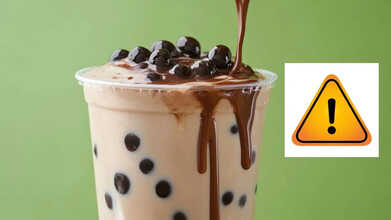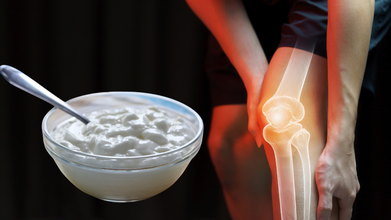- Health Conditions A-Z
- Health & Wellness
- Nutrition
- Fitness
- Health News
- Ayurveda
- Videos
- Medicine A-Z
- Parenting
- Web Stories
What Is The 'Jordan Formula' For Eating Right?

Credits: Canva
It’s a familiar feeling: you sit down with your favorite food—maybe samosas, biryani, or something sweet, and before you know it, you’ve eaten far more than you intended.
Then comes the guilt, the bloating, the uneasy stomach, and a promise to “never do that again.” Sound familiar?
Overeating, especially when indulging in comfort or festive foods, can lead to digestive issues like gas, heaviness, and acidity. While enjoying food is a wonderful part of life, many of us struggle with portion control—especially when it comes to the dishes we love most.
Celebrity nutritionist Rujuta Diwekar, known for her relatable approach to food and fitness, recently shared a simple trick to stop this cycle.
In a video posted on her Instagram, she introduced what she calls the “Jordan Formula”—a mindful way to enjoy your food without overdoing it or feeling guilty later.
What Is the Jordan Formula?
The concept is surprisingly simple, yet effective. Rujuta explains it using an example most Indians are familiar with: sabudana vada.
Here’s how it works:
- Take one sabudana vada and eat it.
- Before reaching for the second one, ask yourself honestly: Can I also eat a third?
- If the answer is no, then don’t eat the second. Stick to just one.
Similarly, if you’ve eaten three vadas, pause and ask: Can I eat a fourth or even a fifth comfortably? If not, stop at three.
This approach trains you to check in with your body before continuing to eat, helping you stop just short of feeling full, when your stomach is still comfortable and your mind still in control.
Why This Works
This small pause creates a moment of mindful eating, something that’s missing in most binge-eating episodes.
According to Rujuta, this method allows you to enjoy every bite without feeling deprived. You’re not saying no to the food, you’re just saying yes to your body’s signals.
In her Instagram caption, she writes:
“If you are guilty of eating mindlessly, the Jordan formula can help. An easy way to enjoy every bite without guilt or gas.”
This formula encourages a more thoughtful relationship with food—one where you're present with each bite rather than rushing through it and paying the price later.
Eating Mindfully in Changing Seasons
Rujuta also reminds us that our appetite changes with the weather. You may notice that you're less hungry during scorching summers or harsh winters, and that’s completely natural. In warmer months especially, our digestive systems tend to be more sensitive, making it important to:
- Increase fiber intake through seasonal fruits and vegetables
- Stay hydrated with water, nimbu pani, or buttermilk
- Choose lighter meals that are easy to digest
This helps support digestion, prevent bloating, and maintain energy levels without overeating.
Is Bubble Tea Putting Your Health at Risk? Experts Warn About Lead Exposure

Credits: Canva
A trendy drink that’s become a social media favorite may now have fans thinking twice, after questions were raised about one key ingredient.
Bubble tea, also called boba or pearl milk tea, first appeared in Taiwan in the 1980s. It’s usually made with tea, milk or creamer, a sweetener, and, of course, the signature chewy tapioca pearls.
While its colorful, Instagram-worthy appeal has made it popular around the world, recent safety tests from Consumer Reports suggest there could be reason for concern.
Boba Tea Contains Lead?
Bubble tea, the Taiwanese drink made of black tea, milk, sugar, and chewy tapioca pearls, has won fans worldwide since its debut in the 1980s. But recent findings suggest it may deserve a closer look.
A Consumer Reports investigation in the US found high lead levels in some bubble tea products, echoing earlier concerns about cassava-based foods. The tapioca pearls, the drink’s signature “bubbles,” are made from cassava starch, which can absorb lead and other heavy metals from the soil as the plant grows.
Why Are Tapioca Pearls Harmful?
Lead is naturally present in the Earth’s crust, and much of the world’s soil contains significant contamination. Many fruits and vegetables, including cassava, can absorb heavy metals during growth.
Consumer Reports tested tapioca pearls from popular bubble tea chains, Gong Cha and Kung Fu Tea, as well as packaged boba products from Trader Joe’s and WuFuYuan. Every sample contained some lead. Thankfully, none exceeded the levels that Consumer Reports considers concerning, and none had dangerous levels of arsenic, cadmium, or mercury in a single serving.
“These levels weren’t high enough for us to advise people to completely avoid bubble tea,” said James E. Rogers, PhD, director of food safety research and testing at Consumer Reports.
“However, this wasn’t a comprehensive survey of the boba and bubble tea market. The fact that three out of four samples contained more than half of our level of concern for lead in a single serving is a strong reminder that bubble tea should be enjoyed occasionally, rather than as an everyday drink.”
Beyond heavy metals, the starchy composition of tapioca pearls can pose other risks. Eating large amounts may slow stomach emptying, a condition called gastroparesis, or even cause blockages. Symptoms can include nausea, vomiting, and abdominal pain, and people with already slow digestion may be particularly affected.
Bubble Tea and Kidney Health
Bubble tea can also impact kidney health. In 2023, Taiwanese doctors removed more than 300 kidney stones from a 20-year-old woman who reportedly drank bubble tea in place of water. Ingredients such as oxalate and high phosphate levels can contribute to stone formation, though this extreme case likely reflects unusually high consumption.
Jason Tsou, General Manager at WuFuYuan’s parent company, Shanghai ZhouShi Foodstuffs, said the company routinely tests its products for lead through an accredited laboratory. Following these recent findings, they have introduced stricter standards to ensure safety, as per New York Post.
Can L-Theanine Really Make You Focus Better? What Science Says About the ‘Calm but Alert’ Effect

Credits: Canva
If you often struggle with stress or restless nights, a warm cup of tea is likely your go-to for calming down. Tea’s comforting reputation isn’t just tradition, studies suggest it can support heart health, aid digestion, and more. One key component behind these benefits is L-theanine, an amino acid found in tea leaves. Available as a supplement, L-theanine is thought to help reduce anxiety, improve sleep, and even enhance focus.
It is gaining popularity as a supplement for enhancing focus and relaxation. But does it live up to the hype? Here's what recent research reveals about its effects on attention, reaction time, and cognitive performance.
What Is L-Theanine?
L-theanine is an amino acid naturally found in tea leaves, especially in green tea and loose-leaf varieties, and is believed to offer several health benefits. But first, it helps to understand what amino acids are and why they matter.
Amino acids are the building blocks of proteins and, ultimately, life itself, as per Healthline. They are molecules used by all living organisms to make proteins. Humans need 20 different amino acids to function properly, 11 of which are essential and must come from food.
Although L-theanine is not essential for survival, research has explored its effects on brain function and cognitive performance.
You can consume L-theanine by drinking teas such as green tea, white tea, or matcha, or by taking it in supplement form, including tablets and capsules.
Can L-Theanine Really Make You Focus Better?
Yes, several studies suggest that L-Theanine can enhance focus and attention. For instance, a 2011 study published in ScienceDirect found that L-Theanine improved attention performance and reaction time in individuals prone to high anxiety.
Additionally, a 2021 study in PubMed Central reported that a single dose of L-Theanine reduced reaction time to attention tasks and increased the number of correct answers in working memory tasks among middle-aged adults.
PMC
L-Theanine appears to have a positive impact on reaction time. A 2025 study published in PubMed found that a 200 mg dose of L-Theanine reduced hit reaction time by 38.65 milliseconds in sleep-deprived individuals during a traffic-related visual recognition task.
PubMed
L-Theanine Effect with Caffeine
When combined with caffeine, L-Theanine may offer enhanced cognitive benefits. A 2010 study in PubMed indicated that the combination of 97 mg of L-Theanine and 40 mg of caffeine improved accuracy during task switching and reduced self-reported tiredness in young adults.
PubMed
L-Theanine: Is It Safe to Use?
L-Theanine is generally considered safe when consumed in moderate amounts, such as those found in tea or supplements. However, as with any supplement, it's advisable to consult with a healthcare provider before starting, especially if you have underlying health conditions or are taking other medications.
L-Theanine shows promise as a natural supplement to enhance focus and reaction time, particularly when combined with caffeine. While more research is needed to fully understand its long-term effects, current studies suggest it can be a useful tool for those seeking improved cognitive performance without the jitteriness associated with other stimulants.
Disclaimer: The information provided is based on current research and should not replace professional medical advice.
Is Yogurt as Good for Your Bones as It Is for Your Gut?

Credits: Canva
We have been often told that milk, and dairy products are great for our bone health, especially due to its high vitamin D and calcium components. This is also true for yogurt, but is there enough evidence to support this argument? A new study published in the journal Frontiers in Nutrition checks exactly take. It has taken a closer look at the question of eating yogurt to improve bone health. While the findings may show promise, the researchers say that evidence is not strong enough to call yogurt a bone-strengthening food on its own.
Why yogurt Is Believed To Be Bone Healthy?
yogurt is made through fermentation of milk, and it uses two specific bacterial strains, namely: Lactobacillus delbrueckii bulgaricus and Streptococcus thermophilus.
While yogurt and milk share similar nutrient profiles, yogurt offers additional benefits due to the above mentioned bacteria. They also produce vitamins and biologically active compound that could support overall health.
When we age, our bones lose mass and bone formation slows down, while resorption or bone breakdown speeds up. This also increases risk of fragility fractures. This is why nutrients like calcium, vitamin D, phosphorus, and potassium play vital role in maintaining strong bones. yogurt is also rich in protein, calcium, zinc, selenium, and vitamin B and K which is also recommended as bone-friendly food.
Some experts also believe that yogurt offers an edge over milk due to the higher levels of certain vitamins and minerals it provides. Furthermore, they claim that there is a better absorption of nutrients through yogurt. However, despite this theory, the studies have only shown mixed results.
How Was the Study On yogurt's Impact On Bone Health Conducted?
For the latest study, the researcher reviewed the existing evidence on yogurt's impact on bone health. The study analyzed data from scientific databases, including PubMed, Cochrane Library, and Scopus. These were published between 1970 to 2023.
The team had both the groups, namely: healthy adults and individuals with osteoporosis. The study included a comparison of yogurt intake to no yogurt, non-fermented dairy products, or standard osteoporosis treatments. Then, they evaluated observational studies and randomized controlled trials (RCTs), extracting data on participants’ demographics, yogurt dosage, study duration, and results.
In order to ensure accuracy, the study also assessed the quality of evidence using established methods such as the Newcastle-Ottawa scale and the GRADE system. Finally, they conducted meta-analyses to evaluate two major outcomes, hip fracture risk and femoral bone mineral density (BMD).
What Did The Study On Analyzing yogurt's Impact On Bone Health Find?
The study found that of the 1,302 studies reviewed, only 12 met the eligibility criteria that represented 14 observational studies. Most of them were conducted in the US, Europe, and Asia, and focused on postmenopausal women, a group that is particularly vulnerable to bone loss.
There were some studies that found a relation between higher yogurt consumption to better bone mineral density. On fact, one of them even reported that people who consumed yogurt more frequently had a lower risk of radius osteoporosis and higher hip and femoral neck BMD levels.
However, when researchers pooled the data, the overall effect was quite small. The meta-analysis showed that yogurt intake had a statistically positive but clinically negligible impact on bone density (SMD = 0.009) and no clear association with hip fracture risk.
The team also noted several limitations. Most studies didn’t specify the type of yogurt consumed, whether it was full-fat or low-fat, fortified or plain, or contained live bacterial cultures. Since all the data came from observational studies, it was also hard to prove a cause-and-effect link between yogurt and stronger bones.
© 2024 Bennett, Coleman & Company Limited

